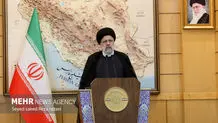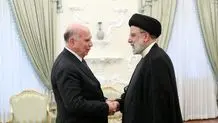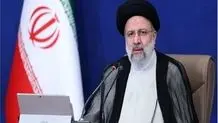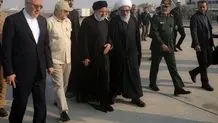Raeisi meets UN chief, counterparts in New York
Iranian President Ebrahim Raeisi held separate meetings with his counterparts in New York, the US.
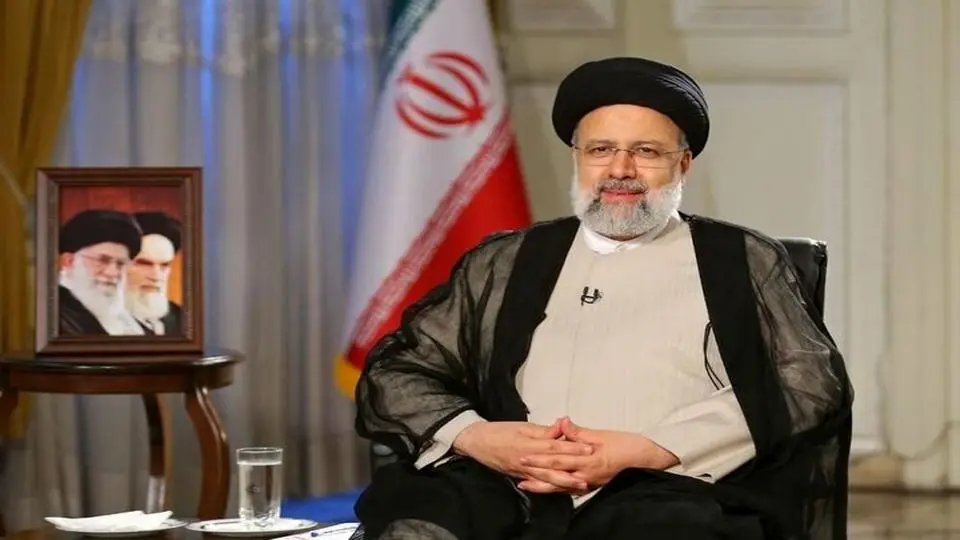
MEHR: Iranian President Ebrahim Raeisi held separate meetings with his counterparts in New York, the US.
Raeisi, who is in New York to take part in the 78th session of the United Nations General Assembly, met with some of his counterparts as well as the Secretary-General of the United Nations António Guterres.
"Unfortunately, despite the wishes of the governments of Iran and Kyrgyzstan, the economic and commercial relations between the two countries have not yet expanded proportionately to the existing capacities of the two countries," said Raeisi in a meeting with Sadyr Japarov, the President of Kyrgyzstan.
Emphasizing the importance of quick action to remove the obstacles to the development of relations between the two countries, the President considered the delay in the establishment of the joint commission between Iran and Kyrgyzstan as one of these obstacles and demanded the quick activation of this commission.
Raeisi also pointed out the remarkable scientific progress of Iranian youth despite the cruel sanctions and suggested to the President of Kyrgyzstan to spend more time traveling to Tehran so that he can visit Iran's science and technology parks and learn about the achievements of Iran's youth.
The President added, "Iran is ready to share these achievements with the friendly country of Kyrgyzstan."
Sadyr Japarov, for his part, congratulated Iran on full membership in the Shanghai Organization and considered this membership and the increase in cooperation resulting from it to benefit the two nations and the region.
Stating that the two countries have very good capacities to develop relations, the President of Kyrgyzstan expressed his regret over the non-development of economic and trade relations between Tehran and Bishkek and said, "By completing the China-Central Asia-Iran corridor and also developing the rail communication platforms of the Central Asian countries with areas like Bandar Abbas in Iran can expand commercial and economic exchanges between the two countries."
Japarov also welcomed Raeisi's proposal regarding the exchange of Iran's scientific capabilities and demanded an increase in cooperation between the two countries in international organisations.
In a meeting with Zoran Milanović, the President of Croatia, Raeisi stressed the desire of the Islamic Republic of Iran to expand political, economic and trade relations with the country.
Welcoming the announcement of the position of the President of Croatia to adopt an independent policy, the President stated, "Despite the efforts of some Western countries that seek to impose their interests and values on other countries of the world, the Islamic Republic of Iran has been able to turn sanctions and pressures into opportunities and achieve significant progress in various fields, especially in the field of technology."
Raeisi said that the era of imposing opinions and demands on the nations is over, adding, "Why do America and Europe, who own nuclear arsenals, prevent other countries from benefiting from nuclear technology? The Islamic Republic of Iran has achieved remarkable achievements in the fields of agriculture, industry and medicine through the peaceful use of nuclear energy, and in this regard, last year we were able to treat one million patients with radiopharmaceuticals."
Emphasizing that the Islamic Republic of Iran is ready to cooperate with all countries that want cooperation with Iran and will welcome this cooperation, the President added, "Regarding Palestine, we believe that referring to the vote of the people living in Palestine and the Palestinians is the only solution to this crisis."
Zoran Milanović, for his part, announced his country's interest in developing relations with the Islamic Republic of Iran and stated that there are suitable capacities between Iran and Croatia to develop interactions in various fields.
Milanović described the adoption of an independent foreign policy as the basis for reaching the ideal world, and while declaring his opposition to any attempt to impose values and cultures on other countries, he condemned America's withdrawal from the nuclear agreement.
Raisi met and held talks with Algerian President Abdelmadjid Tebboune during which the President referred to the very good capacities of Iran and Algeria and emphasised the efforts of the officials of the two countries to improve the level of relations, especially in the field of commercial and economic interactions.
"The improvement of relations between Iran and Algeria was stopped due to the special circumstances of coronavirus, which should be restored and be improved with the efforts of the officials of the two countries," he added.
Raeisi described the activation of the joint commissions of the two countries to be effective in expanding cooperation between Iran and Algeria while appreciating the positions of the Algerian President in supporting the oppressed people of Palestine and condemning the actions of the Zionist regime, as well as the positions of Algeria in the African Union in preventing Zionist influence, expressing hope that the expansion of cooperation between the two countries in the political, economic and commercial fields will increase regional and international cooperation.
Stating that Iran has no problem in developing relations with neighbouring countries, the President considered the interference of Western countries, especially America, as the cause of disruption in the relations of regional countries.
For his part, Abdelmadjid Tebboune referred to the history of good relations between the two countries and emphasised the serious effort to revive and improve the relations between Iran and Algeria.
He stated that he is familiar with the political, economic, scientific and research capacities of the Islamic Republic of Iran, and demanded cooperation with Iran in these fields and said, "We know that sanctions have turned Iran into a powerful country and we are ready to improve our relations with Iran."
The President of Algeria, emphasising his country's support for the rights of the Palestinian people in the creation of an independent Palestinian state, said that the strengthening of relations between Islamic and regional countries has increased the strength of these countries in dealing with threats.
Tebboune stated that the Western countries seek to abuse the countries of the region, and emphasised the necessity of confronting the influence and interference of the Western countries and considered becoming strong as one of the best ways to achieve this goal.
Raisi, in the meeting with the President of Kazakhstan Kassym-Jomart Tokayev, which took place at the headquarters of the United Nations pointed to the meetings and good agreements between the Presidents of the two countries last year and emphasized efforts to accelerate the full implementation of the agreements, especially in the economic and business field.
The President described the neighbourhood of Iran and Kazakhstan through the Caspian Sea and membership in the Shanghai Organisation as a suitable platform for the development of relations between the two countries and said, "Increasing the exchange of goods, both by sea and by rail, is in the interest of the two nations and the countries of the region, and steps should be taken to accelerate the realisation of this goal."
The President of Kazakhstan, in turn, referred to the vast capacities of the two countries, saying that Iran is a strategic partner and a close friend of Kazakhstan,
He welcomed the increase in the exchange of goods between the two countries, announcing his country's interest in accelerating the implementation of the agreements between the two countries.
Raeisi made the remarks in a meeting with Secretary-General of the United Nations António Guterres.
He expressed appreciation for the efforts made by the Secretary-General and the United Nations Secretariat, emphasizing the importance of justice, the eradication of discrimination and poverty, and sustainable security as key missions of the United Nations.
The President criticized the war-mongering nature of major powers and hegemony, stressing the need for UN intervention to prevent actions that could disrupt global peace and stability.
He also highlighted concerns about the political and social future of Afghanistan, Yemen, Syria, and Africa due to excessive demands and power-seeking behavior.
Raeisi affirmed Iran’s readiness to participate in initiatives promoting peace and security worldwide, stating that cooperation with the United Nations is a fundamental aspect of the Islamic Republic’s policy.
He urged the UN to obtain accurate news about Iran, as media affiliated with dominant states often misrepresent the Islamic Republic, saying that the Iranian society enjoys racial justice and the government attaches great importance to women’s rights.
He also commended Iran for its constructive role in Yemen’s developments and supported Iran’s initiatives to end the Yemen crisis.
آخرین اخبار Iran را از طریق این لینک پیگیری کنید.

